AIA Thinkwell + Pledgewell
EEG sensors, voice AI inspire a commitment to health + wellness.
- Sydney, NSW
- Melbourne, VIC
- Brisbane, QLD
AIA Vitality is the world’s largest health and wellness program. For their annual conference, we created two interactive digital marketing experiences to support audiences in their commitment to healthy living. With members using an EEG sensor to calm an ocean with their mind in AIA Thinkwell, and data from AI voice recognition visualising the cumulative effect of health pledges in AIA Pledgewell, the experiences served as an experiential marketing activation point for the conference’s focus on ‘living well’.
Visualise wellbeing
The IdeaHumans are generally terrible at articulating our feelings, doubly so in a professional conference setting. AIA needed a way to entice attendees of their Vitality Summit to engage in conversations about wellbeing in the workplace. The idea was to visualise the wellbeing of attendees in two ways, both designed to drive engagement and start conversations.
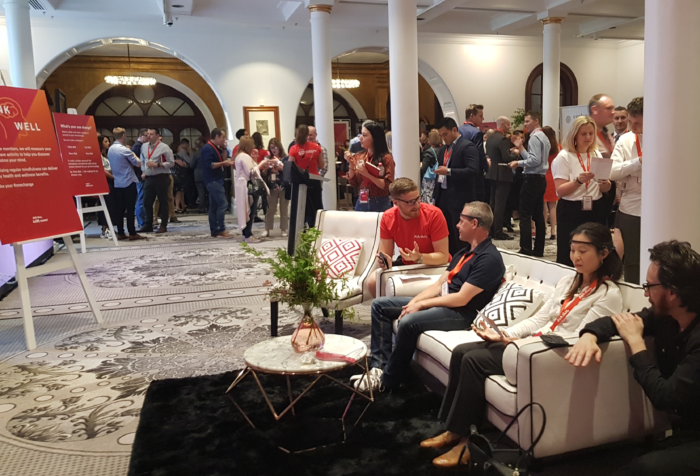
The first activation – AIA Thinkwell – would use an EEG sensor to visualise invisible brain activity data as attendees attempted to calm their mind – and an ocean visualisation – in just 90 seconds. At the end of those 90 seconds, audiences would have a greater appreciation of how focused meditation can change our mental state.
The second activation – AIA Pledgewell – used a novel and theatrical implementation of speech to text and natural language processing. Using this technology, the experiential marketing activation saw members speak a health pledge into a microphone, which was then translated into a growing data visualisation. Here, the visual categorisation of pledges sparked conversation around the similarities and differences of attendee’s pledges.
Mechanics + metaphor
Creative DevelopmentWellbeing can be subjective and intensely personal, so we knew that recognisable and relatable metaphors would be key to engaging AIA’s diverse audience. Visualising EEG data for AIA Thinkwell challenged us to ask how we internally visualise clarity and chaos. Initial creative development focused on the concepts of change – day to night, winter to spring – relying on nature as the metaphor for relatable changes in states.

However, continued prototyping returned unsatisfying results. The realism of nature and detail lost much of the ethereal nature of our mood. Artistic abstraction also proved unrelatable and confusing during early testing. Our most pleasing results were in the use of the ocean. Its perpetual motion and recognisable changes had the fluidity we needed for the metaphor and proved evocative and relatable in testing.


Meanwhile, AIA Pledgewell needed to remain fun and playful enough to entice people to experiment and make a vocal pledge in public. For this, we chose a minimalist and bold art direction which relied on animation and symbolism to give context and meaning to each attendee’s pledge within the larger experiential marketing visualisation.

Experiments with biometric sensors
Prototyping SensorsIn the initial development of AIA Thinkwell, we needed to prototype and test a range of EEG sensors. Working with biometric sensors in an experiential marketing activation is a balancing act. On one hand, you need to set up the experience – in this case, fitting the headset – on a range of users so that data can be captured accurately. On the other, you need to ensure that this process doesn’t take too long or disrupt the user experience.
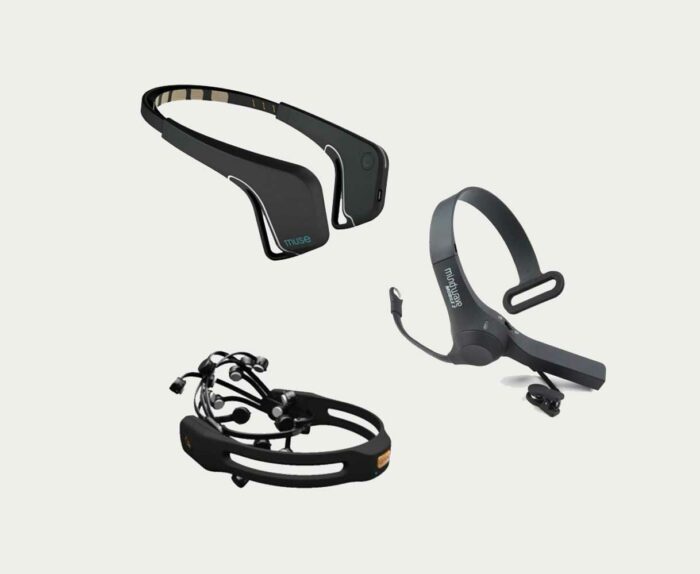
Conferences are by no means laboratory environments and, similar to many VR activations, there may be a need to pump hundreds or thousands of people through the activation each day. With this in mind, we knew that while the integrity of the creative is important, it had to be balanced with the practicality of the installation.
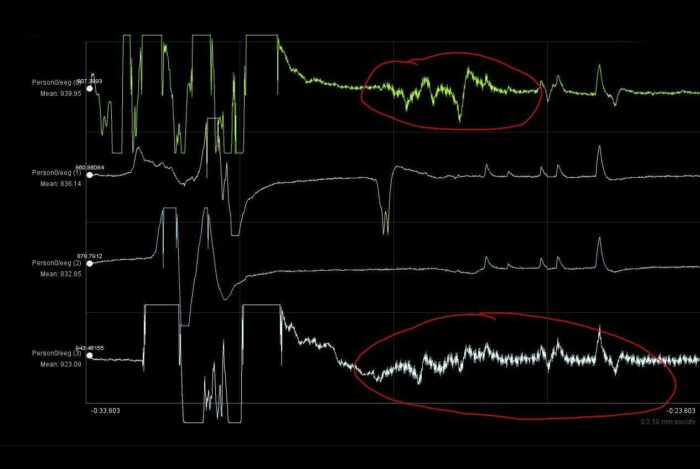
Biometric data visualisation
EEG Data
We ended up working with the Muse headset for two reasons. First, the licensing was more commercially viable for a single headset. Second, and more importantly, this headset gave us a stable reading with the quickest install time. With this headset, we would be able to gather data from four electroencephalography (EEG) sensor points on the user. This meant that it was easy to see if we weren’t getting a clear reading via static interference, and the device was also simple to adjust when this was the case.
Speech to text
Voice AIFor AIA Pledgewell, we used Google Speech-to-Text to convert visitors' spoken pledges to text, capitalising on their neural network powered API. This process would transcribe spoken words captured through a microphone podium. Then, a cloud-based natural language processing pass would determine which of the four categories the visitor’s pledge fell into.
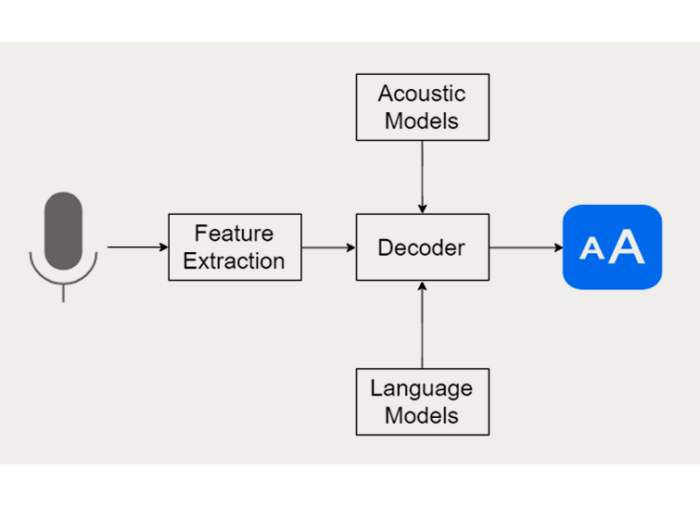
Our main fear with AIA Pledgewell was pining our creativity to the performance of Google's speech to text and natural language processing suite. This fear was compounded by the fact that the experiential marketing activation would be implemented in a public environment, with the added complexity of attendees with multiple backgrounds and accents.

While the usual response to this kind of problem is to create subjective or ‘hand wave’ responses to voice data, such as colour and mood, we knew early on this wouldn’t be an option. AIA Pledgewell was about individual pledges, so we’d need to accurately define each and every pledge. With some testing and iteration, we were able to achieve an acceptable performance rate, while the tone of the digital marketing activation accommodated for the occasional edge case.
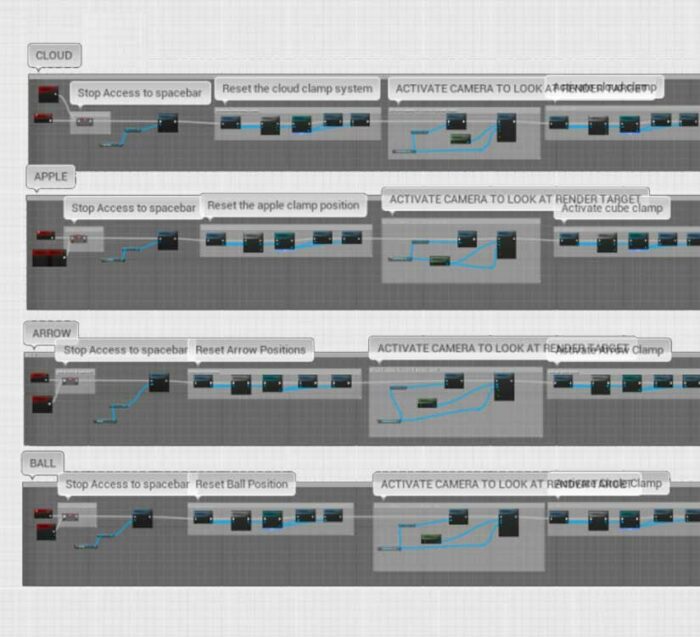
An ever-changing visualisation
Sentiment AnalysisThroughout the activation, we expected hundreds of variations in visitors’ pledges. From ‘Doing fifty push ups every morning’, to ‘Meditating for five minutes after work’. Each spoken pledge needed to be visualised, categorized and contextualised in real time while visitors were standing at the microphone.
Relying on python and Google sentiment analysis APIs, we used Unreal Engine to create a dynamic global illumination visualisation for each of the four categories. In this system, each pledge would generate a new physics asset, which would in turn populate a dynamic scene created for that category. The result was four dynamic animations which would change and evolve throughout the day.
Conversations across the country
ResultsInitially scoped for a single event, the AIA Thinkwell and AIA Pledgewell activations proved durable and successful enough that they have been rolled out across the country. The success of these digital marketing activations was not in the electromagnetic data collected, nor the database of individual pledges. Instead, their success came through the fact that both approaches provided a tangible experience which AIA delegates could use to have meaningful conversations with attendees.
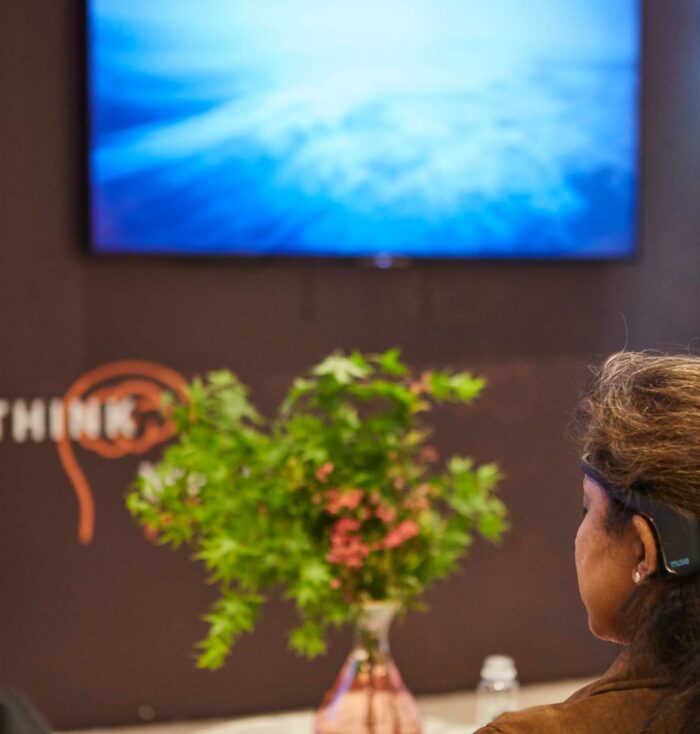


Stay in the loop
Subscribe to our newsletter to receive updates and insights about AIA Thinkwell + Pledgewell and other S1T2 projects.













